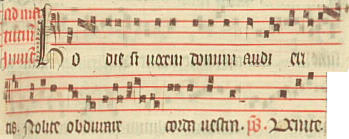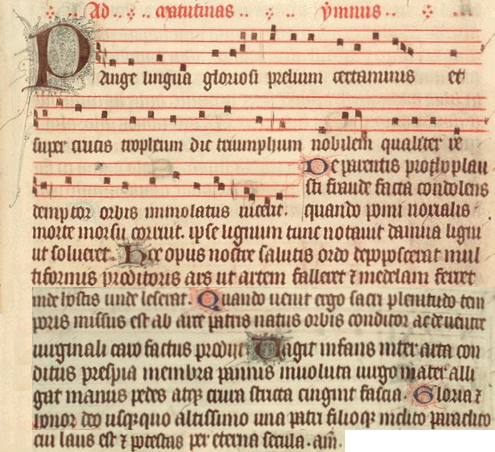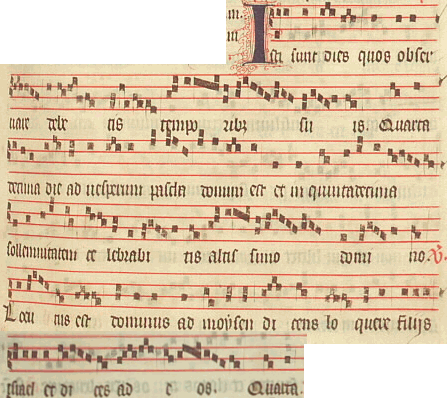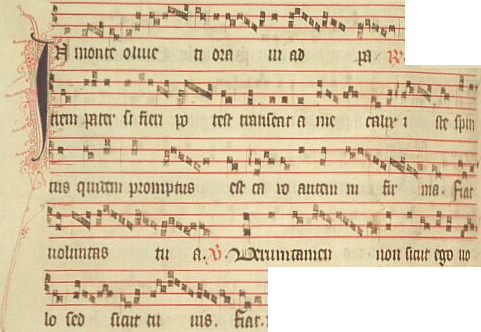READINGS: LENT SUNDAY V
ἐάν τις τὸν ἐμὸν λόγον τηρήσῃ, — θάνατον οὐ μὴ θεωρήσῃ εἰς τὸν αἰῶνα.
Even Years: Numbers 12:1-15
1 וַתְּדַבֵּר
מִרְיָם
וְאַהֲרֹן
בְּמֹשֶׁה
עַל־אֹדוֹת
הָאִשָּׁה
הַכֻּשִׁית
אֲשֶׁר לָקָח
כִּי־אִשָּׁה
כֻשִׁית
לָקָח׃
4 Suddenly Yahweh said to Moses, Aaron and Miriam, 'Come out, all three of you, to the Tent of Meeting.' They went, all three of them, 5 and Yahweh descended in a pillar of cloud and stood at the entrance of the Tent. He called Aaron and Miriam and they both came forward.
6 Yahweh said: Listen to my words! if there is a prophet among you, I reveal myself to him in a vision, I speak to him in a dream. 7 Not so with my servant Moses; to him my whole household is entrusted; 8 to him I speak face to face, plainly and not in riddles, and he sees Yahweh's form. How, then, could you dare to criticise my servant Moses?
9 Yahweh's anger was aroused by them. He went away, 10 and as soon as the cloud left the Tent, there was Miriam covered with a virulent skin-disease, white as snow! Aaron turned to look at her and saw that she had contracted a virulent skin-disease. 11 Aaron said to Moses: 'Oh, my Lord, please do not punish us for the sin we have been foolish enough to commit. 12 Do not let her be like some monster with its flesh half eaten away when it leaves its mother's womb!'
13 Moses pleaded with Yahweh. 'O God,' he said, 'I beg you, please heal her!' 14 Yahweh then said to Moses, 'If her father had done no more than spit in her face, would she not be unclean for seven days? Have her shut out of the camp for seven days, and then have her brought in again.' 15 Miriam was shut out of the camp for seven days. The people did not set out until she returned.
Odd Years: Hebrews 10:26-39
ἑκουσίως
γὰρ
ἁμαρτανόντων
ἡμῶν μετὰ τὸ
λαβεῖν τὴν
ἐπίγνωσιν τῆς
ἀληθείας,
Even Years: Origen, Homily 7 on Numbers, 1-2. 8:37,40 Odd Years: John Chrysostom, Homily 21 on Hebrews, 2-3 (PG 63, 150-152)
GOSPELS FOR THE THREE CYCLES
Invitatory Psalm & BACK

PSALMS and BACK
2 וַיֹּאמְרוּ
הֲרַק
אַךְ־בְּמֹשֶׁה
דִּבֶּר
יְהוָה הֲלֹא
גַּם־בָּנוּ
דִבֵּר וַיִּשְׁמַע
יְהוָה׃
3 וְהָאִישׁ
מֹשֶׁה עָנוֹ
מְאֹד מִכֹּל
הָאָדָם
אֲשֶׁר
עַל־פְּנֵי
הָאֲדָמָה׃ ס
4 וַיֹּאמֶר
יְהוָה
פִּתְאֹם
אֶל־מֹשֶׁה
וְאֶל־אַהֲרֹן
וְאֶל־מִרְיָם
צְאוּ שְׁלָשְׁתְּכֶם
אֶל־אֹהֶל
מוֹעֵד
וַיֵּצְאוּ
שְׁלָשְׁתָּם׃
5 וַיֵּרֶד
יְהוָה
בְּעַמּוּד
עָנָן וַיַּעֲמֹד
פֶּתַח
הָאֹהֶל
וַיִּקְרָא
אַהֲרֹן
וּמִרְיָם וַיֵּצְאוּ
שְׁנֵיהֶם׃
6 וַיֹּאמֶר
שִׁמְעוּ־נָא
דְבָרָי
אִם־יִהְיֶה
נְבִיאֲכֶם
יְהוָה
בַּמַּרְאָה
אֵלָיו
אֶתְוַדָּע
בַּחֲלוֹם
אֲדַבֶּר־בּוֹ׃
7 לֹא־כֵן
עַבְדִּי
מֹשֶׁה
בְּכָל־בֵּיתִי
נֶאֱמָן
הוּא׃
8 פֶּה
אֶל־פֶּה
אֲדַבֶּר־בּוֹ
וּמַרְאֶה
וְלֹא
בְחִידֹת
וּתְמֻנַת
יְהוָה
יַבִּיט
וּמַדּוּעַ
לֹא יְרֵאתֶם
לְדַבֵּר
בְּעַבְדִּי
בְמֹשֶׁה׃
9 וַיִּחַר
אַף יְהוָה
בָּם
וַיֵּלַךְ׃
10 וְהֶעָנָן
סָר מֵעַל
הָאֹהֶל
וְהִנֵּה מִרְיָם
מְצֹרַעַת
כַּשָּׁלֶג
וַיִּפֶן
אַהֲרֹן
אֶל־מִרְיָם
וְהִנֵּה
מְצֹרָעַת׃
11 וַיֹּאמֶר
אַהֲרֹן
אֶל־מֹשֶׁה
בִּי אֲדֹנִי
אַל־נָא
תָשֵׁת
עָלֵינוּ
חַטָּאת
אֲשֶׁר
נוֹאַלְנוּ
וַאֲשֶׁר
חָטָאנוּ׃
12 אַל־נָא
תְהִי
כַּמֵּת
אֲשֶׁר
בְּצֵאתוֹ מֵרֶחֶם
אִמּוֹ
וַיֵּאָכֵל
חֲצִי
בְשָׂרוֹ׃
13 וַיִּצְעַק
מֹשֶׁה
אֶל־יְהוָה
לֵאמֹר אֵל נָא
רְפָא נָא
לָהּ׃ פ
14 וַיֹּאמֶר
יְהוָה
אֶל־מֹשֶׁה
וְאָבִיהָ יָרֹק
יָרַק
בְּפָנֶיהָ
הֲלֹא
תִכָּלֵם שִׁבְעַת
יָמִים
תִּסָּגֵר
שִׁבְעַת
יָמִים מִחוּץ
לַמַּחֲנֶה
וְאַחַר
תֵּאָסֵף׃
15 וַתִּסָּגֵר
מִרְיָם
מִחוּץ
לַמַּחֲנֶה שִׁבְעַת
יָמִים
וְהָעָם לֹא
נָסַע עַד־הֵאָסֵף
מִרְיָם׃
1 Miriam, and Aaron too, criticised Moses over the Cushite woman he had married. He had indeed married a Cushite woman. 2 They said, 'Is Moses the only one through whom Yahweh has spoken? Has he not spoken through us too?' Yahweh heard this. 3 Now Moses was extremely humble, the humblest man on earth.
οὐκέτι
περὶ ἁμαρτιῶν
ἀπολείπεται
θυσία,
φοβερὰ
δέ τις ἐκδοχὴ
κρίσεως καὶ
πυρὸς ζῆλος ἐσθίειν
μέλλοντος
τοὺς
ὑπεναντίους.
ἀθετήσας
τις νόμον Μωϋσέως
χωρὶς
οἰκτιρμῶν ἐπὶ
δυσὶν ἢ τρισὶν
μάρτυσιν
ἀποθνῄσκει:
πόσῳ
δοκεῖτε
χείρονος
ἀξιωθήσεται
τιμωρίας ὁ τὸν
υἱὸν τοῦ θεοῦ
καταπατήσας,
καὶ
τὸ αἷμα τῆς
διαθήκης
κοινὸν
ἡγησάμενος ἐν
ᾧ ἡγιάσθη,
καὶ
τὸ πνεῦμα τῆς
χάριτος
ἐνυβρίσας;
οἴδαμεν
γὰρ τὸν
εἰπόντα, ἐμοὶ
ἐκδίκησις, ἐγὼ
ἀνταποδώσω:
καὶ
πάλιν, κρινεῖ
κύριος τὸν
λαὸν αὐτοῦ.
φοβερὸν
τὸ ἐμπεσεῖν
εἰς χεῖρας
θεοῦ ζῶντος.
ἀναμιμνῄσκεσθε
δὲ τὰς
πρότερον
ἡμέρας,
ἐν
αἷς
φωτισθέντες
πολλὴν
ἄθλησιν
ὑπεμείνατε
παθημάτων,
τοῦτο
μὲν
ὀνειδισμοῖς
τε καὶ
θλίψεσιν
θεατριζόμενοι,
τοῦτο
δὲ κοινωνοὶ
τῶν οὕτως
ἀναστρεφομένων
γενηθέντες:
καὶ
γὰρ τοῖς
δεσμίοις
συνεπαθήσατε,
καὶ
τὴν ἁρπαγὴν
τῶν
ὑπαρχόντων
ὑμῶν μετὰ
χαρᾶς προσεδέξασθε,
γινώσκοντες
ἔχειν ἑαυτοὺς
κρείττονα ὕπαρξιν
καὶ μένουσαν.
μὴ
ἀποβάλητε οὖν
τὴν παρρησίαν
ὑμῶν,
ἥτις
ἔχει μεγάλην
μισθαποδοσίαν,
ὑπομονῆς
γὰρ ἔχετε
χρείαν ἵνα τὸ
θέλημα τοῦ θεοῦ
ποιήσαντες
κομίσησθε τὴν
ἐπαγγελίαν.
ἔτι
γὰρ μικρὸν
ὅσον ὅσον, ὁ
ἐρχόμενος
ἥξει καὶ οὐ
χρονίσει:
ὁ
δὲ δίκαιός μου
ἐκ πίστεως
ζήσεται,
καὶ
ἐὰν
ὑποστείληται,
οὐκ εὐδοκεῖ ἡ
ψυχή μου ἐν αὐτῷ.
ἡμεῖς
δὲ οὐκ ἐσμὲν
ὑποστολῆς εἰς
ἀπώλειαν,
ἀλλὰ
πίστεως εἰς
περιποίησιν
ψυχῆς.
Hebrews 10:26-39 26 If, after we have been given knowledge of the truth, we should deliberately commit any sins, then there is no longer any sacrifice for them. 27 There is left only the dreadful prospect of judgement and of the fiery wrath that is to devour your enemies. 28 Anyone who disregards the Law of Moses is ruthlessly put to death on the word of two witnesses or three; 29 and you may be sure that anyone who tramples on the Son of God, and who treats the blood of the covenant which sanctified him as if it were not holy, and who insults the Spirit of grace, will be condemned to a far severer punishment. 30 We are all aware who it was that said: Vengeance is mine; I will pay them back. And again: The Lord will vindicate his people. 31 It is a dreadful thing to fall into the hands of the living God. 32 Remember the great challenge of the sufferings that you had to meet after you received the light, in earlier days; 33 sometimes by being yourselves publicly exposed to humiliations and violence, and sometimes as associates of others who were treated in the same way. 34 For you not only shared in the sufferings of those who were in prison, but you accepted with joy being stripped of your belongings, knowing that you owned something that was better and lasting. 35 Do not lose your fearlessness now, then, since the reward is so great. 36 You will need perseverance if you are to do God's will and gain what he has promised. 37 Only a little while now, a very little while, for come he certainly will before too long. 38 My upright person will live through faith but if he draws back, my soul will take no pleasure in him. 39 We are not the sort of people who draw back, and are lost by it; we are the sort who keep faith until our souls are saved.
(SC 29, 133-136 - no Greek)
Sicut Apostolus dicit, Haec omnia in figura contingebant illis, scripta sunt autem propter commonitionem nostram: quaero quid commonitionis accipiamus ex eo quod lectum est nobis, quia detraxerunt Aaron et Maria de Moyse, et propter hoc correpti sunt, Maria vero etiam leprosa efficitur. Tanta autem fuit cura correptionis huius, ut dum Maria septimanae tempus expleret in lepra, populus Dei non ageret iter ad terram repromissionis, ne tabernaculum testimonii moveretur.
Primo interim moneor, et utiliter ac necessario moneor ex hoc facto ne detraham fratri, ne male loqar de proximo meo, ne aperiam os meum ad derogandum non solum sanctis, sed et quibuslibet proximis meis. Vides quanta ex hoc indignatio Dei fuerit, quanta vindicta processerit
According to St Paul, everything that happened to the Israelites was symbolic, and was recorded as a warning to us. If this is so we should try to learn what we can from the story of Aaron and Miriam, who were rebuked by God for speaking against their brother Moses. Miriam received the additional punishment of leprosy. The chosen people took this chastisement so much to heart that they discontinued their journey to the promised land, and the Tent of the Presence stood still, until Miriam had completed her seven days' exclusion from the camp. What we are given here, in the first place, is a useful and necessary lesson not to speak ill of our neighbours, and not to make derogatory remarks about good and holy people, or indeed about anyone at all, when we see the anger and vengeance of God that result.
Isti ergo quia detrahunt Moysi, habent lepram in anma sua et sunt in homine interiore leprosi, et ideo habentur extra castra Ecclesiae Dei. Sive ergo haeretici sint qui derogant Moysi, sive de Ecclesia sint qui detrahunt fratribus, et male loquuntur de proximis suis, omnes qui hoc vitio aguntur, dubitandum non est quin leprosi sint in anima sua.
Those who do so may be said to speak against Moses. Because of this they become spiritual lepers; their unclean hearts exclude them from the camp which is the Church of God. Now whether speaking against Moses means that these people are heretics, or whether they are members of the Church who slander their brothers and sisters and speak ill of their neighbours, there is no doubt that all who practise this vice are lepers at heart.
Et Maria quidem interveniente Aaron pontifice septima die curatur: nos vero si obtrectationis vitio inciderimus in animae lepram, usque ad finem septimanae mundi, id est, usque ad resurrectionis tempus leprosi in anima permanebimus, et immundi: nisi dum poenitendi tempus est, corrigamur, et conversi ad Dominum Iesum, ac supplicantes ei per poenitentiam purgemur ab immunditia leprae nostrae
In the case of Miriam, this leprosy was healed on the seventh day, thanks to the intervention of Aaron the High Priest; but as for us, if we allow ourselves to indulge our cruel habit of speaking ill of people and our souls are punished with leprosy, we shall continue in our spiritual uncleanness until the last day of all, that is until the day of resurrection, unless we change our ways while there is still time for us to repent and turn to the Lord Jesus, asking him to help us to do penance and be purified.
Audi ergo in consequentibus quid referat, et quibus Moysen laudibus efferat Spiritus sanctus. Et descendit, inquit, Dominus in columna nubis, et stetit ad ostium tabernaculi testimonii. Et vocati sunt Aaron et Maria et steterunt ambo, et dixit ad eos: Audite verba mea. Si fuerit propheta quis vestrum Domini, in visionibus ei agnoscar, et in somnis loquar ei, non sicut famulo meo Moysi, qui in tota domo mea fidelis est, os ad os loquor ad eum, in specie, et non in aenigmate, et gloriam Domini vidit. Et quare non timuistis detrahere famulo meo Moysi? Et ira furoris Domini facta est super illos, discesserunt, et nubes discessit a tabernaculo, et ecce Maria facta est leprosa sicut nix.
And now let us hear the account of what happened afterward, and how the Holy Spirit paid tribute to Moses. Scripture tells us that the Lord came down in a pillar of cloud and stood at the door of the Tent of the Presence. Aaron and Miriam were summoned, and they both came forward. The Lord said to them: Listen to my words. If any one of you is a prophet, I make myself known to him in visions, and speak to him in dreams. It is not so, however, with my servant Moses; he alone is faithful of all my household. With him I speak face to face, clearly and not by means of symbols or parables, and he has seen the glory of the Lord. Why then were you not afraid to speak against my servant Moses? Scripture goes on to say that the Lord's anger struck them, and he dismissed them from his presence. When the cloud departed from the tent, there stood Miriam, white as snow with leprosy.
Videte quid sibi poenae contulerint obtrectatores, quid vero illi cui obtrectaverant, quaesiverint laudis. Sibi turpitudinem, illi splendorem; sibi lepram, illi gloriam; sibi opprobrium, illi magnificentiam quaesiverunt
You see what punishment those envious tongues brought on themselves, and in contrast what honours they earned for the brother they had abused. He was honoured, they were disgraced; he was covered with glory, they were covered with leprosy; he was praised, they were blamed.
Et ideo ille [Apostolus], qui species figurarum et aenigmatum disserebat, dicit: Scimus autem quoniam patres nostri omnes sub nube fuerunt, et omnes in Moyse basptizati sunt in nube et in mari, et omnes eamdem escam spiritalem manducaverunt, et omnes eundem potum spiritalem biberunt. Bibebant autem de spiritali consequente eos petra. Petra autem erat Christus.
[Therefore, in discussing the meanings of figures and symbols, Paul says (1 Cor 10:1-4): I want you to be quite certain, brothers, that our ancestors all had the cloud over them and all passed through the sea. In the cloud and in the sea they were all baptised into Moses; all ate the same spiritual food and all drank the same spiritual drink, since they drank from the spiritual rock which followed them, and that rock was Christ.]
Vides quomodo aenigmata legis Paulus absolvit, et species aenigmatum docet, et dicit quia petra in aenigmate erat apud Moysem, antequam iungeretur huic nostrae Aethiopissae. Nunc in specie petra Christus est. Nunc enim os ad os loquitur per legem Deus. Antea in aenigmate fuit baptismus in nube et in mari, nunc autem in specie regeneratio est in aqua et in Spiritu sancto. Tunc in aenigmate erat manna cibus, nunc autem in specie caro Verbi Dei est verus cibus, sicut et ipse dicit, quia Caro mea vere est cibus, et sanguis meus vere est potus.
You see how Paul solved the symbols of the Law, and taught their reality. He says that the rock was a symbol to Moses, until it was joined to our Ethiopian lady (the Church). Now the rock, in its reality, is Christ. Now God speaks mouth to mouth through the Law. Before, baptism was hidden in the symbols of the cloud and the sea, now rebirth takes place in reality in water and in the Holy Spirit. Then, manna was food by way of symbol, now in reality the flesh of the Word of God is real food, as he himself said: "My flesh is really food, and my blook is really drink."
Μὴ οὖν
ἀποβάλητε τὴν
παῤῥησίαν ὑμῶν,
ἥτις ἔχει
μισθαποδοσίαν
μεγάλην Ἄρα ἑνὸς
ὑμῖν δεῖ μόνου,
ἵνα ἀναμείνητε
τὴν μέλλησιν, οὐχ
ἵνα ἀθλήσητε πάλιν.
Πρὸς τὸν στέφανον
αὐτόν ἐστε, φησὶ,
τοὺς ἀγῶνας πάντας
ἠνέγκατε, τοὺς
δεσμοὺς, τὰς θλίψεις,
τὰ ὑπάρχοντα ὑμῶν
ἡρπάγη· τί οὖν;
Πρὸς τὸ
στεφανωθῆναι ἑστήκατε
λοιπόν· τοῦτο
μόνον φέρετε, τὴν
μέλλησιν τοῦ
στεφάνου. Ὢ μέγεθος
παρακλήσεως!
In his letter to the Hebrews the Apostle says that they need endurance to do God's will and obtain what he has promised. The only thing they have to endure is delay; there is no need for a renewed struggle. He means they are on the very threshold of victory; they have undergone all the contests, they have suffered imprisonment, affliction, and confiscation of their possessions, until finally here they stand awaiting their reward, with nothing but this delay still to be endured before they receive it. These words are a great encouragement.
Οὕτως
αὐτοὺς
παρακαλεῖ, ὡς ἄν
τις εἴποι πρὸς ἀθλητὴν
πάντας
καταβαλόντα,
καὶ μηδένα ἔχοντα
ἀνταγωνιστὴν,
εἶτα μέλλοντα
στεφανοῦσθαι,
καὶ οὐ φέροντα
τὸν χρόνον ἐκεῖνον,
καθ' ὃν ὁ ἀγωνοθέτης
ἔρχεται, καὶ τίθησι
τὸν στέφανον· ἐκεῖνος
δὲ ἀκαρτερήτως
ἔχων, θέλοι ἐξελθεῖν
καὶ φυγεῖν, ὡς μὴ
φέρων τὸ δίψος
καὶ τὸν φλογμόν.
Τοῦτο τοίνυν αὐτὸς
αἰνιττόμενος,
τί φησιν; Ἔτι
μικρὸν ὅσον ὅσον,
ὁ ἐρχόμενος ἥξει,
καὶ οὐ χρονιεῖ.
One could imagine them spoken to an athlete who has overthrown all contestants, and then, when it comes to being crowned, cannot wait for the arrival of the judge to place the wreath on his brow. Impatience makes him want to run away, as if the heat and thirst are no longer bearable. The Apostle hints at this in his next words, when he says: In a little while he who is to come will be here; he will not delay.
Ἵνα γὰρ
μὴ λέγωσι, Καὶ πότε
ἥξει; ἀπὸ τῶν
Γραφῶν αὐτοὺς
παρακαλεῖ Ὁ δὲ
δίκαιος, φησὶν, ἐκ
πίστεως ζήσεται·
καὶ ἐὰν ὑποστείληται,
οὐκ εὐδοκεῖ ἡ
ψυχή μου ἐν αὐτῷ.
[To preclude their asking "When will he come?" he encourages them from Scripture:] The righteous shall live by faith; no one who shrinks back in fear can please me.
Μεγάλη
αὕτη ἡ παράκλησις,
ὅταν δεικνύῃ
τις τὸ πᾶν
κατωρθωκότας,
καὶ διὰ μικρᾶς ῥᾳθυμίας
ἀπολλύντας αὐτό.
Ἡμεῖς δὲ οὐκ ἐσμὲν
ὑποστολῆς εἰς ἀπώλειαν,
ἀλλὰ πίστεως εἰς
περιποίησιν
ψυχῆς Ταῦτα εἴρηται
μὲν πρὸς Ἑβραίους,
κοινὴ δέ ἐστι
παραίνεσις καὶ
πρὸς πολλοὺς τῶν
ἐνταῦθα
συνειλεγμένων.
Πῶς καὶ τίνι τρόπῳ;
Πρὸς τοὺς ὀλιγοψύχους,
πρὸς τοὺς
μικροψύχους. Ὅταν
γὰρ ἴδωσι
πονηροὺς εὐπραγοῦντας,
ἑαυτοὺς δὲ
δυσπραγοῦντας,
ἀλύουσι, δυσανασχετοῦσιν·
ὅταν ποθῶσιν ἐκείνων
τὴν κόλασιν καὶ
τὴν ἐκδικίαν, [ἢ]
ὅταν τῶν οἰκείων
πόνων τοὺς
μισθοὺς ἐκδέχωνται.
Ἔτι μικρὸν ὅσον
ὅσον, ὁ ἐρχόμενος
ἥξει, καὶ οὐ
χρονιεῖ, εἶπε τότε
ὁ Παῦλος.
This is an exhortation and warning to those who have won through to the end that a moment's carelessness can still lose them everything. But, he continues, we are not among those who shrink back and are lost; we have the faith that leads to life. These words were addressed to the Hebrews in the first place, but may equally well be used to encourage many of those gathered here, when they are downcast and tempted to lose heart. People are often troubled and find it hard to endure the sight of the wicked flourishing when they themselves are not succeeding. They long for vengeance and punishment to be inflicted on sinners, and to be rewarded far their own pains. And then it is that the Apostle speaks his words of comfort: In a little while he who is to come will be here; he will not delay.
Καὶ ἡμεῖς
τοίνυν πρὸς τοὺς
ῥᾳθύμους ταῦτα
λέγωμεν· Πάντως
ἔσται κόλασις,
πάντως ἥξει, ἐπὶ
θύραις λοιπὸν
τὰ τῆς ἀναστάσεως.
Πόθεν δῆλον,
φησίν; Οὐ λέγω ἀπὸ
προφητῶν· οὔτε
γὰρ πρὸς
Χριστιανοὺς μόνον
μοι νῦν ὁ λόγος,
ἀλλὰ κἂν Ἕλλην ᾖ,
θαῤῥῶ πάνυ, καὶ
τὰς ἀποδείξεις
παρέχω, καὶ διδάξω
αὐτόν· καὶ πῶς,
ἄκουε· Πολλὰ
προεῖπεν ὁ
Χριστός. Εἰ μὴ ἐξέβη
ἐκεῖνα, μηδὲ τούτοις
πιστεύσῃς· εἰ
δὲ πάντα ἐξέβη,
τί περὶ τῶν
λειπομένων ἀμφιβάλλεις;
Καίτοι πολὺ ἀπίθανον
ἦν, μηδενὸς ἐκβάντος,
περὶ ἐκείνων
πιστεύειν· ἢ ὅτε
πάντα ἐξέβη, τούτοις
ἀπιστεῖν. Μᾶλλον
δὲ ἐπὶ ὑποδείγματος
ποιήσω τὸ πρᾶγμα
φανερόν. Εἶπεν, ὁ
Χριστὸς ὅτι τὰ Ἱεροσόλυμα
ἁλώσεται, καὶ ἁλώσεται
ἅλωσιν οἵαν οὐδέποτε,
καὶ ὅτι οὐκ ἔτι
ἀναστήσεται·
καὶ ἐξέβη εἰς ἔργον
ἡ πρόῤῥησις. Εἶπεν
ὅτι θλῖψις ἔσται
μεγάλη, καὶ ἐξέβη.
We ourselves can also assure the listless and negligent that there will be a time for punishment, the Lord will certainly come; the resurrection and all its consequences are close at hand. If you wonder how we know this, I do not say: from the prophets. Christ himself foretold many things. If his predictions of immediate events were false, we need not believe what he foretold of the last days. But if they have all come true, we can entertain no doubts about the things that are still to come. Let a few examples prove my point. Christ foretold the fall of Jerusalem, declaring that the city would suffer a defeat unlike anything ever experienced before, and never rise again. This prediction has been truly fulfilled. He foretold a time of great distress, which indeed came.
Εἶπεν ὅτι
καθάπερ σίνηπι
σπαρὲν, οὕτως ἐκταθήσεται
τὸ κήρυγμα· καὶ
τοῦτο ὁρῶμεν
καθ' ἑκάστην ἡμέραν
τὴν οἰκουμένην
ἐπιτρέχον Εἶπεν,
ὅτι Ἐν τῷ κόσμῳ
θλίψιν ἕξετε· ἀλλὰ
θαρσεῖτε, ἐγὼ
νενίκηκα τὸν κόσμον,
τουτέστιν, Οὐδεὶς
ὑμῶν περιέσται·
καὶ τοῦτο διὰ τῶν
πραγμάτων ὁρῶμεν
ἐκβεβηκός. Εἶπεν
ὅτι πύλαι ᾅδου οὐ
κατισχύσουσι
τῆς Ἐκκλησίας,
καὶ ταῦτα
διωκομένης, καὶ
ὅτι οὐδεὶς σβέσει
τὸ κήρυγμα· καὶ
μαρτυρεῖ καὶ
ταύτῃ τῇ προῤῥήσει
ἡ τῶν πραγμάτων
πεῖρα.
He also described how the Gospel would spread abroad like a mustard plant grown from a tiny seed. And so in fact we see it being carried day after day to the ends of the earth. [He said, "In the world you will have tribulation, but take courage. I have conquered the world," that is, None of you shall perish. Experience bears this out. He said that the gates of hell will not overpower the Church, even when it is persecuted in this way. And none shall quench the preaching. Experience also bears witness to this.]
*A* , *B* , *C*
Prayer

